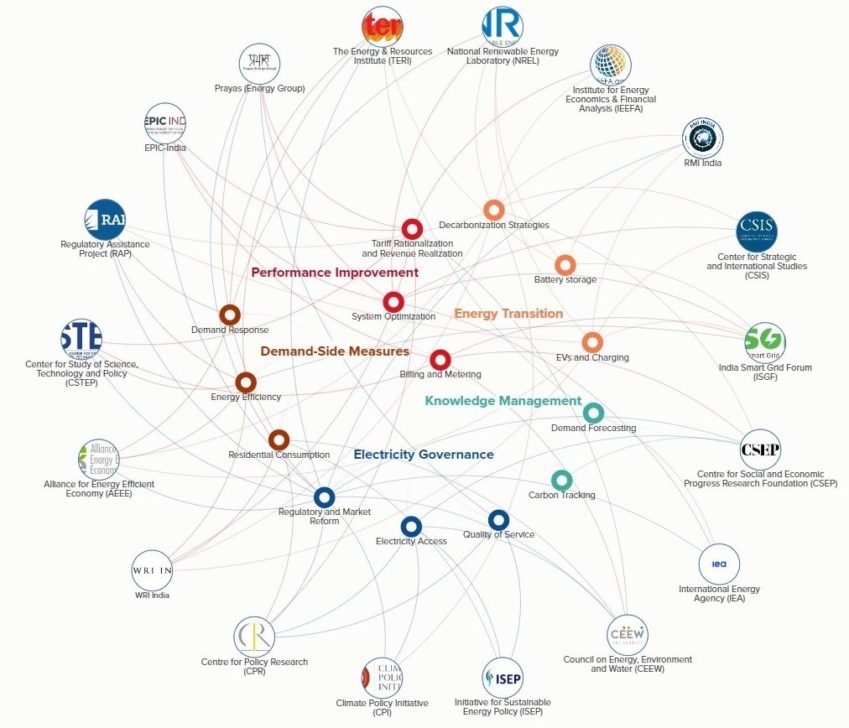
Mapping the Path to DISCOM Transformation Success in India
In June 2020, RMI India co-hosted its first virtual convening on the Discom Transformation Platform along with the Rocky Mountain Institute (RMI) and NITI Aayog. The event brought together 16 leading civil society organizations (CSOs) to identify new ways of collaborating and supporting distribution companies (DISCOMs), following the recent amendments to the Electricity Act. The “e-workshop” served to expand RMI India’s DISCOM Transformation Platform, which is designed to enable effective collaboration among power sector stakeholders, such that they can provide the best possible support to “lighthouse DISCOMs” across the country.
Given the importance of DISCOMs performance for the overall health of the power sector, as well as to facilitate a quick and just transition to clean energy, focusing on the power sector support ecosystem is vital to success. The ecosystem of CSOs supporting and engaging with DISCOMs consists of a variety of organizations—some new and some that have been around for decades—with diverse and in some cases overlapping thematic expertise and approaches.
And yet, an easily approachable overview that summarizes these efforts seemed to be lacking. This information gap creates a barrier to the effectiveness and nature of collaborations, as well as limits the scaling potential of replicable interventions. Therefore, an emergent opportunity highlighted in the June workshop was to identify, document, and visualize the CSO stakeholder ecosystem and its contribution to power distribution, as it exists today.
To address this need, RMI India and RMI created a stakeholder map for the CSO ecosystem, informed by research, consultation, and feedback from the workshop participants and all organizations represented on the map. The result is a web-based map which is designed to offer multiple features:
- It provides a snapshot of the broad thematic and working areas within the context of power distribution that different CSOs are associated with.
- The map increases alignment and collaboration between different members of this community by capitalizing on collective strengths and avoiding duplication of effort.
- It creates a space that allows users to interact with different organizational profiles. The profiles include details on the states the organization is active in, links to their website, specific recent work showcased under “Spotlight,” and the approach they employ in their work, as well as a point of contact.
- The map enables DISCOMs to match their needs with specific CSO expertise by identifying CSO partners to co-develop, pilot, and scale solutions.
The map will be updated on a quarterly basis to reflect the dynamic nature of CSO’s work in the power sector. This will be done through direct engagement with the respective points of contact.
By acting as an easy-to-navigate overview of leading organizational profiles, the map aims to enable partnerships—both bilateral and multilateral—among CSOs, and between DISCOMs and individual or multiple CSOs. It offers greater visibility of the CSO ecosystem to potential funding bodies that may be seeking partnership support to expand or invest in new operations. At the same time, the map can also help flag gap areas of expertise, and indicate newer areas for CSOs to invest resources in.
The value proposition of this map lies in creating more visibility around individual CSOs and its potential to create opportunities and foster collaboration and partnerships. It will also help in realizing the intrinsic value associated with discerning the CSO-DISCOM narrative in India, lending a framework to understand a complex stakeholder system, and speaking to power sector priorities.
In so doing, it helps advance the ambitions of the larger DISCOM Transformation Platform to plan, pilot, and scale integrated clean energy technologies, through enabling direct engagement and offering coordinated support from leading sector experts. Ultimately, this stakeholder map broadens the scope for value creation that may otherwise be lost in an ecosystem with disparate entities.
